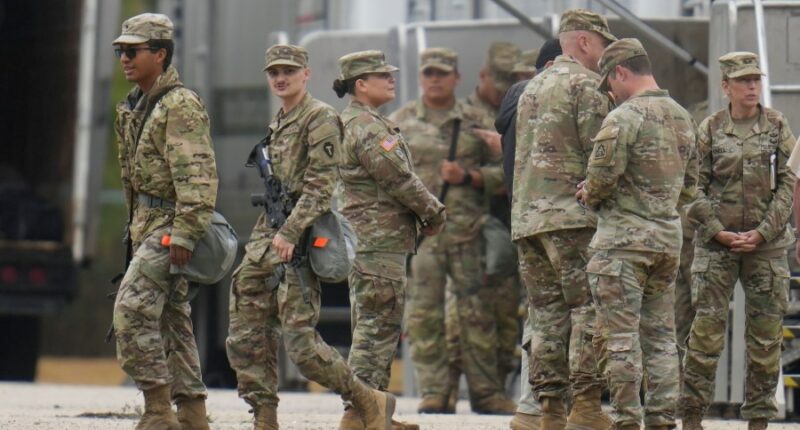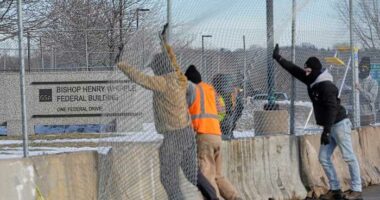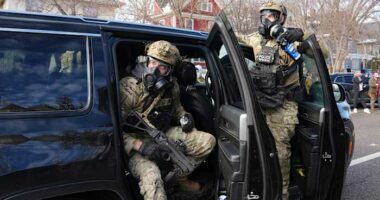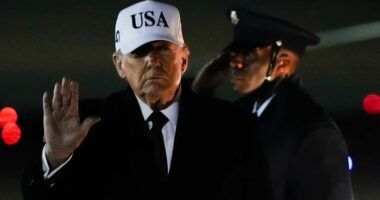Share this @internewscast.com

A judge has temporarily halted the deployment of National Guard troops in the Chicago area for a minimum of two weeks, citing a lack of significant evidence pointing to an impending “danger of rebellion” in Illinois amidst Trump’s intensified immigration enforcement efforts.
This decision marks a win for the Democratic leaders of the state and city who have been in a verbal tussle with President Trump over his initiative to dispatch troops to key urban locales.
Gov. JB Pritzker commented, “The court underscored what we already know: there is no credible threat of a rebellion in Illinois, and the National Guard has no role in the streets of American cities such as Chicago.”
The judge indicated that the administration contravened the 10th Amendment, which reserves certain powers for states, as well as the 14th Amendment, which guarantees due process and equal protection under the law.
It wasn’t clear what the troops will do now, including a small number outside a U.S. Immigration and Customs Enforcement building in Broadview.
Guard was already in Illinois
The legal action, initiated on Monday by both Chicago and Illinois, emerged as Guard members from Texas and Illinois were en route to a U.S. Army Reserve Center in Elwood, situated southwest of Chicago. All 500 are under the U.S. Northern Command and their activation was initially slated for 60 days.
Some troops spent Wednesday night in vans near the Broadview facility close to Chicago and were seen Thursday morning on patrol behind temporary fencing. For weeks, the ICE location has been a focal point of intermittent conflicts between demonstrators and federal officers.
Earlier Thursday, U.S. Justice Department lawyer Eric Hamilton said the Guard’s mission would be to protect federal properties and government law enforcers in the field, not “solving all of crime in Chicago.”
The nearly 150-year-old Posse Comitatus Act limits the military’s role in enforcing domestic laws. But Trump has said he would be willing to invoke the Insurrection Act, which allows a president to dispatch active duty military in states that are unable to put down an insurrection or are defying federal law.
“Chicago is seeing a brazen new form of hostility from rioters targeting federal law enforcement,” Hamilton told the judge.
Perry, however, wasn’t swayed.
“I have seen no critical evidence that there is a danger of rebellion in the state of Illinois,” she said hours later.
Order could be extended
The judge said the order would expire on Oct. 23 at 11:59 p.m. She set an Oct. 22 hearing by telephone to determine if the order should be extended for another 14 days.
Perry said the actions of the Department of Homeland Security are largely rooted in Trump’s “animus toward Illinois elected officials.” She expressed skepticism of the federal government’s characterization of protests in Broadview.
“DHS’s narrative of events is simply unreliable,” said Perry, who was appointed to the bench by President Joe Biden.
Heavy turnout at the downtown courthouse caused officials to open an overflow room with a video feed of the hearing. Chicago Mayor Brandon Johnson sat in a corner of the courtroom.
The city and state have called the deployments unnecessary and illegal.
“The president does not have the unfettered discretion to turn America’s military against its own citizens when they exercise their constitutional rights,” Illinois Attorney General Kwame Raoul said.
Trump, meanwhile, has portrayed Chicago as a lawless “hellhole” of crime despite statistics that show a significant drop in crime. He said Pritzker and Mayor Brandon Johnson should be arrested for not protecting agents during immigration sweeps. Pritzker’s response: “Come and get me.”
Court challenges elsewhere
Also Thursday, a federal appeals court heard arguments over whether Trump had the authority to take control of 200 Oregon National Guard troops. The president had planned to deploy them in Portland, where there have been mostly small nightly protests outside an ICE building.
A judge on Sunday granted a temporary restraining order blocking the move. Trump had mobilized California troops for Portland just hours after the judge first blocked him from using Oregon’s Guard.
Two dozen other states with a Democratic attorney general or governor signed a court filing in support of the legal challenge by California and Oregon. Twenty others, led by Iowa, backed the Trump administration.
Chicago’s federal court issued other decisions this week related to immigration enforcement. In one, a judge said immigration agents have repeatedly violated a 2022 consent decree outlining how ICE can make so-called warrantless arrests. That decree requires ICE to show documentation for each arrest it makes for people besides those being targeted.
Immigrant advocacy groups believe hundreds of people arrested around Chicago could qualify for reduced bond or have ankle monitors removed.
Guard expected on ground in Memphis
Trump previously sent troops to Los Angeles and Washington. In Tennessee, Memphis Mayor Paul Young said troops would begin patrolling Friday. Republican Gov. Bill Lee supports the role.
Police Chief Cerelyn “CJ” Davis said she hoped the Guard would direct traffic and have a presence in retail corridors, but not set up checkpoints or make the city “feel like there is this over-militarization in our communities.”
California won and lost court decisions this summer over troops in Los Angeles, where they protected federal buildings and immigration agents.
A judge in September said the deployment was illegal. By that point, just 300 of the thousands of troops sent there remained on the ground. The judge did not order them to leave. The government later took steps to send them to Oregon.
___
Associated Press writers Ed White in Detroit, Geoff Mulvihill in Philadelphia and Adrian Sainz in Memphis, Tennessee, contributed to this report.











